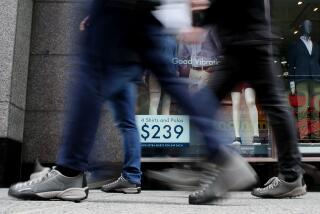Greenspan Says Fear Could Be Worst Y2K Bug
- Share via
WASHINGTON — Federal Reserve Chairman Alan Greenspan warned Friday that “fear-induced” reactions by consumers and businesses to the 2000 computer glitch present a bigger challenge to the economy than the millennium bug itself.
Greenspan expressed particular concern about possible stockpiling of goods by businesses that anticipate year-end shortages and suggested that such actions could help create the very shortages they hope to avoid.
“Should a large number of companies want to hold even a few extra days of inventories . . . bottlenecks could develop and market pressure could ensue,” the Federal Reserve chief told participants at a White House Y2K readiness conference here.
Another danger, Greenspan said, is that Americans who have heard alarmist predictions of frozen bank accounts and disabled automatic teller machines may withdraw large sums of cash in advance, creating the potential for personal misfortune.
“Those people who do cash out a significant part of their deposits only increase the risk that they will become victims of crime or fraud,” he said.
Greenspan expressed confidence that the nation’s banks, savings and other financial institutions have prepared for the Y2K phenomenon successfully and that year-end computer breakdowns will be minimal.
Unless they are modified to become “Y2K compliant,” older computer hardware and software that identify years with only two digits may interpret the arrival of 2000 as 1900, causing equipment and programs to malfunction.
The federal government has estimated that it will spend $8.6 billion to eradicate the millennium bug, and private industry is pouring more than $50 billion into the job.
Because the prevention effort in this country has been so extensive, Greenspan said, he views the risk of a large-scale breakdown as “negligible” and encouraged Americans to avoid excessive hoarding of cash and supplies. “Consumers should prepare for the century date change as they would for any long weekend,” he said.
Greenspan’s concerns are shared by many private-sector economists who worry that the anxiety generated by the millennium bug could disrupt the nation’s economy, at least temporarily.
“The panic that could set in could cause substantial economic disruption in everything from people hoarding gas and bread to taking money out of bank accounts to refusing to fly in airplanes,” said Stephen Moore, director of fiscal policy at the Cato Institute, a free market think tank based in Washington. “All of those things would cause a real jolt to the economy. To paraphrase Franklin Roosevelt, when it comes to Y2K, all we have to fear is fear itself.”
‘70s Energy Crisis Shortages Cited
Economists cite as an example the 1970s energy crisis. Temporary shortages of gasoline were caused in part by anxious drivers who filled their tanks more frequently because they feared that they would not be able to find fuel later. As a result, long lines of automobiles formed in front of service stations, and the supply of fuel could not keep up with demand.
The same phenomenon could repeat itself in late December as consumers try to prepare for the arrival of Jan. 1, 2000.
“It could create artificial shortages in basics from toilet paper to generators to bottled water,” said Sung On Sohn, chief economist for Wells Fargo & Co. “It’s like when everyone goes out to buy plywood in advance of a hurricane.”
The potential effect on businesses could be exacerbated by the widespread adoption of highly efficient “just-in-time” inventory systems over the last decade. Businesses have been able to cut costs dramatically because transportation and communication improvements have enabled them largely to eliminate their former reliance on large stockpiles.
Concerns about Y2K shortages could reduce confidence in the just-in-time systems, creating the first significant inventory instabilities in years, economists said. Since World War II, many periods of economic turmoil have been caused by inventory fluctuations.
“What’s so wondrous and wonderful about this current economy is that it’s been on such a smooth keel for such a long time,” said Moore. “If you cause a big swing upward and then downward in inventories [and] a big swing upward and downward in saving rates, that causes a lot of disruption to an otherwise smooth and prosperous economic cycle that we’re in now.”
While advising Americans to keep their money in their bank accounts, the Federal Reserve nonetheless has prepared for a big increase in the demand for cash by making more currency available.
Greenspan did not rule out the possibility of isolated breakdowns caused by Y2K computer malfunctions. But he said that the private sector is flexible enough to make quick fixes if they occur.
“If we avoid fear-induced, significant economic responses in the months ahead, the century date change will, hopefully, replicate the saga of ‘the dog that did not bark,’ ” he said.
*
Coming Sunday: A special report in Business on Y2K and investors’ concerns for financial markets.
More to Read
Inside the business of entertainment
The Wide Shot brings you news, analysis and insights on everything from streaming wars to production — and what it all means for the future.
You may occasionally receive promotional content from the Los Angeles Times.










